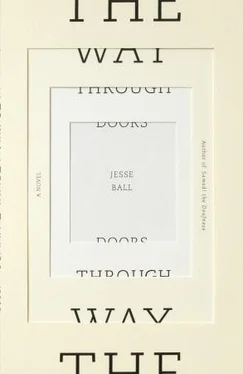— It is far, said Selah. How far I do not know.
— Not far, said his uncle. If only you knew the things I know.
He rested his great head against the wood of the molding. He now seemed not like to Selah’s uncle, or indeed to any uncle, but more like to Aslan, the fabled lion of Narnia. Selah longed to be cast through the air by his soft breath, to be told the certain wonders of a bewondered world by this impeccable, imponderable beast.
— There are three ways, Selah. Three ways that you can go if you want to find the vanished Mora Klein. You must go by the inn. That is the same, no matter which way you choose. The first way is to go and speak with Levkin. He is the start of the first path. You will gain Mora more easily, but you will lose someone else forever.
Selah looked at him wordlessly.
— The second way is to come with me. I will take you somewhere where there may be a way forward. But that way is uncertain, and may not even exist.
— And the third way? asked Selah.
— The third way?
His uncle looked at him with a puzzled expression.
— You just said there were three ways. I heard you.
— I never said that. There are only two ways. But if you thought you heard of a third way…
His uncle’s face looked like the seventh whisker of a devil-cat intent upon the stalking of its prey.
— If you heard of a third way, then perhaps you should take it.
— But that’s the thing, said Selah. I don’t know the third way. I only heard of it from you.
— Well, I must be going, said Selah’s uncle, who still resembled very much an enormous lion. Are you coming?
— I don’t think so, said Selah.
He pulled out his desk chair and sat down in it. His uncle left the room more quietly than Selah would have thought was possible, and Selah was one who took pride in moving quietly.
Selah looked first at one of his hands and then at the other. Hands, he thought. Ordinary hands. What can I do with them? How can I find Mora Klein? He looked up at the wall. Posted there was a drawing.

How well he had forecast his own fate. Selah rose and went into the bathroom. The clocks! He had forgotten entirely about the clocks. Selah rushed back into the room and buzzed down to Rita.
— Yes, she said.
— Rita, could you come up here for a moment?
— One minute, she said.
Selah counted out the minute slowly. On the sixtieth second, the door swung open and Rita waltzed in.
— Rita, said Selah. I don’t think the clocks are three hours ahead. Why did you tell me they were?
— Because, said Rita, I like to perplex you. Everyone does. You’re good at not being perplexed, and so everyone wants to ruin your unperplexability.
— Ah, said Selah. Thank you.
Rita spun around. Her wool dress stopped well above the knee, and she wore knee-high socks.
— Rita…said Selah.
She looked back over her shoulder at him.
— Yes?
— Would you whisper something in my ear?
— All right, she said, licking her lips like a cat. Close your eyes.
Selah closed his eyes and sat very still. He was wearing a vest, trousers, black shoes, spats, and a white shirt with the sleeves rolled. He rested his elbows on the desk and let his head sink into his hands. His breathing slowed. In his head he thought of the dog he had always wanted, a Kerry blue terrier. They were poacher’s dogs, from Ireland, and were not afraid of anything. If only he had his Kerry blue with him, things would be easier. This is how he felt often. Mora, Mora, Mora, he thought to himself, and the snowflakes spun down through the air. In what world were you lost, and which thread have you left me?
— I can do a cartwheel, whispered Rita, and so can you. There were nine outside of the black house, and seven within. Nine defeat seven, but not beyond the walls, and so they waited within while planes passed overhead, and the battle of Britain continued, day after day, in an asylum just north of the Canadian border. Yes, I drove a truck while the war effort made its way south then east along the old road that’s now been paved over. I began with the gold rush and told my secrets in a million wild ways in the watery concourses that figure well in man’s esteem. I saved every penny I ever made and invested it all in U.S. Steel, and when the war came, my bank burst with gold, and I bought an island and manufactured servants from the earth like golems, and set them to serve me forever. But I won’t live forever.
Selah breathed deeply. Rita’s lips brushed his ear.
— I told men the way in which they might improve the world. Instead they improved themselves at the world’s expense. I wrote in a ledger the cost of each action, and how all things are linked, and any movement is a crime. I went on holiday as a child with a child, and as children we sat in low boats on the skin of streams and ate from baskets and called out to taller ones and were called out to in our turn. We laughed when we were told that we would one day lose our skin and become piles of bones that had no laughter in them. And we knew too that this was a lie, for once a thing has happened once, it cannot be stopped from happening again and again. Events are continuous, not broken, and they never move on. Stories tell themselves one to another, over and over, never ceasing, and we skip here and there, saying this is consciousness, this acrobatic feat, but what of remaining? What of the story of a stone in a field that is a stone and stays upon an evening when there will be rain but there is not yet, and the last moment of redness is paused about the tiny cloud that lingers on the sketched sky? Yes, the little cloud whose name is Sillen, who himself has seen all the wicked deeds that men to the west have done, and who goes now into the east, with word of new rebellion.
Rita drew a breath, and he felt her body through her thin dress.
— I cannot be sure how long I waited between worlds for this new post. I was a wisp, a saint, a gladiolus, a gladius in the beckoning hand of a gladiator. Who poured water in a windowsill down into the potted plant, longing that I might grow? And the sound from the street below, the courtship of earth and sky, the noise of radios and singing, of revelry. Names bear names upon themselves. They are of no use until afterwards, and at that time they have gone. Three things are required of you: the wishes you made when you first knew the breadth of this life; the contract you signed when you decided your wishes were not true or possible; and the exacting of the punishment you agreed to when you knew you would break the contract of your life.
Rita’s lips touched Selah’s ear again. He could feel her breath. In her thin wool dress she was trembling.
— There is in the little meadow beyond the mind’s reach a steeplechase being run by horses who were once riders of horses. They chase one another, and allow one another to pass in a dancing, laughing way. They cross the paths that cannot be crossed, and they tell the time as it has never been told. Beyond a bank of trees there is a little door, round and made of wood. Someone is behind it, knocking. He has been knocking for hours. Another passes that way. This person, broad-brimmed hat upon cloaked form, stops and unbolts the door. Out of the door steps S., the pamphleteer, the municipal inspector. He looks around at the wide, stretching lawn of the world, everywhere bedecked with huge oaks and stretching canopies that give shade when shade is needed. He is carrying a little bag full of books that he has made.
— Thank you, says S. to the man in the broad-brimmed hat.
Читать дальше













